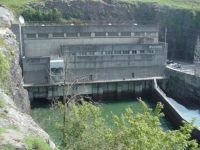In the latest salvo in a decades-long dispute, Florida Gov. Rick Scott (R) says his state in September will ask the U.S. Supreme Court to force Georgia to share some of the water from the Apalachicola, Chattahoochee and Flint (ACF) river basins.
According to a statement issued by Scott, the collapse of discussions, in 2003, among Alabama, Florida and Georgia "left Florida and Alabama in the same disadvantaged position" just as Georgia was able to stake more claims to the waters.
The Apalachicola's water levels are affected by upstream withdrawals from the Chattahoochee and Flint rivers, especially during drought. The Chattahoochee River is the primary water source for Atlanta, which withdrawals 360 million gallons a day.
Georgia Gov. Nathan Deal (R) contends that, over the past two years, Georgia has made "significant" progress on water conservation and proposed an agreement that would satisfy both states. "The fastest and best resolution is an agreement, not a lawsuit going into an election year," he says.
Disputes between states are usually decided by the U.S. Supreme Court. While U.S. federal courts have typically sided with Georgia, a federal district court judge in 2009 said the U.S. Army Corps of Engineers did not have the statutory authority to allocate draws from Lake Lanier, a man-made reservoir formed by Buford Dam along the Chattahoochee River, to drought-stricken Georgia.
In 2011, that decision was reversed by the 11th U.S. Circuit Court of Appeals, which held the Corps of Engineers did not need congressional approval to develop a plan for water allocation in the ACF basin and that the main purpose of Lake Lanier was to provide water to the Atlanta area.
The court gave the Corps another year to make a final determination on how the water should be allocated and shared among the three states. "The Corps is in the midst of updating its operating manuals for the management of the basins—that process is expected to take two to three years," says Rob Holland, public information officer for the Corps of Engineers' South Atlantic Division.
Meanwhile, Florida state officials are working with U.S. lawmakers to ensure the Water Resources Development Act addresses the dispute.



Post a comment to this article
Report Abusive Comment